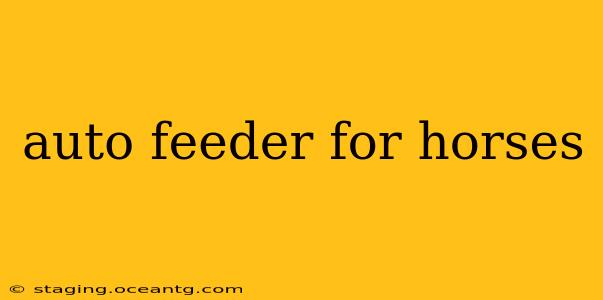Choosing the right auto feeder for your horse can significantly improve their wellbeing and simplify your daily routine. This comprehensive guide explores the various types of horse auto feeders available, their benefits, drawbacks, and crucial factors to consider before making a purchase. We'll answer all your burning questions to help you find the perfect solution for your equine companion.
What are the Different Types of Horse Auto Feeders?
Several types of automatic feeders cater to different needs and budgets. These include:
-
Gravity Feeders: These are the simplest and most common type. They use gravity to dispense feed as the horse consumes it. They are generally less expensive but may require more frequent refills.
-
Slow Feeders: Designed to encourage slower eating, these feeders often have intricate designs that challenge the horse to access the feed. This is beneficial for horses prone to colic or other digestive issues. They come in various materials and designs.
-
Electronic/Automated Feeders: These advanced feeders offer programmable feeding schedules, allowing you to control the amount and timing of feed distribution. Some even include features like remote monitoring and control via smartphone apps. These are often more expensive but offer greater convenience and precision.
What are the Benefits of Using an Automatic Horse Feeder?
Auto feeders provide several advantages, particularly for busy horse owners or those with specific feeding needs for their horses:
-
Consistent Feeding Schedule: Ensures your horse receives food at regular intervals, promoting healthy digestion and reducing stress.
-
Reduced Risk of Overeating: Slow feeders, in particular, help prevent horses from consuming their feed too quickly, minimizing the risk of digestive upset.
-
Convenience: Saves time and effort by automating the feeding process, particularly beneficial for those with multiple horses or limited time.
-
Improved Pasture Management: By supplementing feed via an auto-feeder, you can control grazing and reduce overgrazing on pastures.
-
Health Benefits: Helps manage weight, prevents digestive problems, and improves overall well-being for horses with specific dietary requirements.
How Much Does a Horse Auto Feeder Cost?
The price of horse auto feeders varies significantly depending on the type, size, and features. Gravity feeders are generally the most affordable, while electronic feeders can be considerably more expensive. Expect to pay anywhere from a few hundred dollars to several thousand dollars.
What are the Drawbacks of Using an Automatic Horse Feeder?
While auto feeders offer many advantages, it's essential to be aware of their potential drawbacks:
-
Maintenance: Electronic feeders may require occasional maintenance and repairs.
-
Power Dependence: Electronic feeders rely on a power source, making them vulnerable to power outages. Backup power solutions might be necessary.
-
Initial Investment: The initial cost can be significant, especially for high-end electronic models.
-
Potential for Malfunction: Mechanical or electronic failures can disrupt feeding schedules, potentially leading to issues if not addressed promptly.
-
Not Suitable for All Horses: Some horses may be initially hesitant to use an auto feeder, requiring a gradual introduction period.
How Do I Choose the Right Horse Auto Feeder?
Choosing the right auto feeder involves careful consideration of several factors:
-
Your Horse's Needs: Consider your horse's age, health, feeding habits, and any specific dietary requirements.
-
Your Budget: Determine how much you're willing to invest in an auto feeder.
-
Your Lifestyle: Assess your available time and your need for convenience.
-
Ease of Use and Maintenance: Choose a feeder that is easy to clean, refill, and maintain.
-
Durability and Safety: Opt for a robust and safe feeder made from high-quality materials.
Are Automatic Horse Feeders Safe?
Generally, yes, auto feeders are safe when properly installed and used. However, regular inspection for damage and ensuring the feeder is securely mounted are crucial for preventing accidents.
Can I Make My Own Horse Auto Feeder?
While you can find DIY plans online, it's generally recommended to purchase a commercially manufactured feeder. Building your own may present safety risks if not constructed correctly, and commercially produced feeders undergo rigorous testing to meet safety standards.
By carefully considering these factors and selecting the right type of auto feeder, you can ensure your horse receives consistent, healthy, and stress-free nutrition. Remember, consulting with your veterinarian or equine nutritionist is always advisable before implementing significant changes to your horse's feeding regimen.
